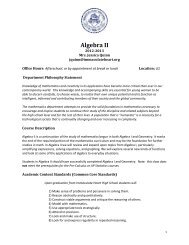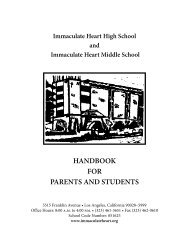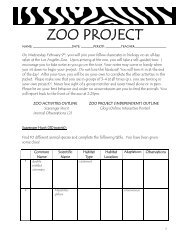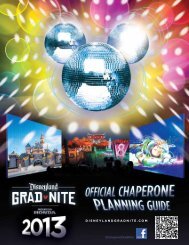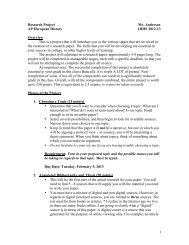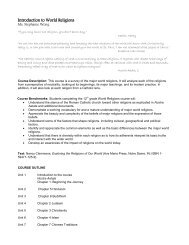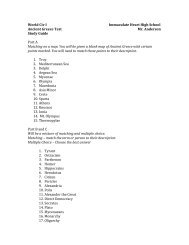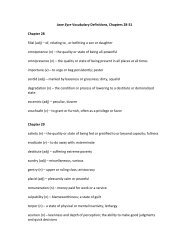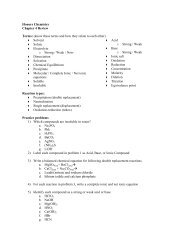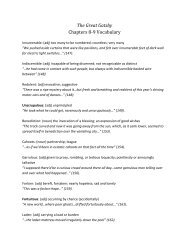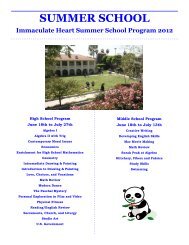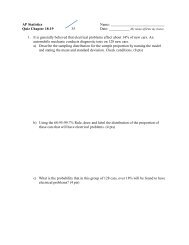AP English Literature - Immaculate Heart High School
AP English Literature - Immaculate Heart High School
AP English Literature - Immaculate Heart High School
Create successful ePaper yourself
Turn your PDF publications into a flip-book with our unique Google optimized e-Paper software.
<strong>AP</strong> <strong>English</strong> <strong>Literature</strong><br />
2012-2013<br />
Dr. Elizabeth Binggeli<br />
ebinggeli@immaculateheart.org<br />
Office Hours: even days, 2:15-3:00<br />
Location: L5<br />
______________________________________________________________________________<br />
<strong>English</strong> Department Philosophy Statement<br />
The <strong>English</strong> department believes that communication is the most basic yet also the most sublime of<br />
gifts. Mastery of language is not an obscure talent only for the erudite and privileged; it is a hard-won<br />
skill available to all. The study of literature is a constant meditation on the self, faith, politics, history,<br />
and culture. Ultimately, reading and writing form the gateway to life-long learning and should ideally<br />
provide students with a foundation for an informed and meaningful intellectual and spiritual life.<br />
Further, we hope to inspire our students to recognize themselves as important and thoughtful members<br />
of the global community.<br />
______________________________________________________________________________<br />
Course Description: <strong>AP</strong> <strong>English</strong> <strong>Literature</strong><br />
<strong>AP</strong> <strong>English</strong> <strong>Literature</strong> is a college-level course designed to prepare you for writing in college as well as for<br />
taking the <strong>AP</strong> <strong>English</strong> <strong>Literature</strong> exam on May 9, 2013. The course follows the curricular requirements<br />
described in the College Board’s <strong>AP</strong> <strong>English</strong> Course Description. Reading selections and writing<br />
assignments will be rich and challenging; the pace of the class, intense. We will concentrate on analyzing<br />
literature through close readings and the development of sophisticated analytical essays.<br />
Students who have successfully completed <strong>AP</strong> <strong>English</strong> <strong>Literature</strong> will:<br />
Employ close reading skills to examine the ways diction, syntax, tone, imagery, symbolism and<br />
allusion work to create textual meaning.<br />
Gain a clear understanding of the genres, periods, critical approaches and citation systems<br />
particular to the analysis of literature.<br />
Understand how cultural and historical contexts shape the formation, dissemination, and<br />
reception of literary works.<br />
Formulate opinions based on close readings and shape those opinions into original arguments<br />
that are shared orally and in writing.<br />
Construct sophisticated timed and untimed analytical essays with clear thesis statements,<br />
organized supporting paragraphs, and compelling textual evidence.<br />
1
______________________________________________________________________________<br />
Academic Content Standards<br />
The primary goal of the <strong>English</strong> department is to help students to read well and communicate<br />
effectively. Upon graduation from <strong>Immaculate</strong> <strong>Heart</strong> <strong>High</strong> <strong>School</strong> students will:<br />
Read critically and recognize literal and implied meaning in varied classic and contemporary<br />
texts, assigned and independently selected.<br />
Write coherent and focused essays that convey a well-defined perspective and tightly reasoned<br />
argument. The writing demonstrates students’ awareness of the audience and purpose.<br />
Approach writing as a process, progressing through the following stages: prewriting, drafting,<br />
evaluating, revising, editing, and publishing.<br />
Write clearly and use formal conventions of <strong>English</strong> language: grammar, spelling, punctuation,<br />
capitalization, syntax, and diction.<br />
Speak effectively and employ formal and informal conventions of the <strong>English</strong> language that are<br />
appropriate to a variety of purposes and audiences.<br />
Respectfully discuss topics, evaluate alternative points of view, and recognize questions and<br />
issues raised in the works they read.<br />
Recognize trends and developments in literature as an art form, including literary movements,<br />
styles, and conventions.<br />
Find, evaluate, and synthesize information for specific purposes, using a variety of properly cited<br />
sources.<br />
Apply critical reading skills to determine the meaning of new words encountered in texts and<br />
use those words accurately.<br />
______________________________________________________________________________<br />
Required Materials<br />
You are required to bring the texts listed below by Tuesday, August 28. Please consult the Follet website<br />
to be certain you purchase the correct editions. Throughout the year, students are expected to consult<br />
the weekly schedule online and bring to class the text(s) currently under discussion. Failure to do so will<br />
adversely affect the participation grade.<br />
Achebe, Chinua. Things Fall Apart<br />
Conrad, Joseph. <strong>Heart</strong> of Darkness<br />
Eliot, George. Middlemarch<br />
Faulkner, William. The Sound and the Fury<br />
Joyce, James. Dubliners<br />
Shakespeare,William. King Lear<br />
Stoppard, Tom. Rosencrantz and Guildenstern are Dead<br />
Vogel and Winans. Multiple Choice & Free Response Questions<br />
In addition to these texts, I will provide students with handouts of selected poems and short stories.<br />
Students will themselves select a contemporary poem and novel of their choice to read as well.<br />
2
______________________________________________________________________________<br />
Class Policies<br />
1. Absences and Missed Work<br />
Written assignments must be uploaded to Turnitin by the due date and time. If you have a legitimate<br />
need for an extension, please meet with me before the due date and we will determine a course of<br />
action together. If a due date passes without an assignment uploaded or a meeting with the student,<br />
that assignment will be dropped a half grade for every calendar day late. If you are absent the day of a<br />
quiz or test, or the day homework is to be handed in, you must expect on the day of your return to take<br />
that quiz or test, or to hand in the homework. In general, it is your responsibility to make up missed<br />
work after an absence; do not assume that I will seek you out and make arrangements on your behalf – I<br />
will simply record a zero for the missed assignment.<br />
2. Turnitin and Academic Integrity<br />
Students will upload take-home essays and other selected assignments to Turnitin.com. Students are<br />
expected to be able to access their Turnitin accounts when necessary.<br />
period class number password<br />
2 5341995 apenglit2<br />
4 5342007 apenglit4<br />
Plagiarism is the use of someone else’s WORDS or IDEAS without giving proper credit. This includes<br />
paraphrasing a source without giving due credit. As you know, plagiarism is a serious breach of academic<br />
integrity and any assignment containing plagiarism will receive a failing grade for that assignment.<br />
3. Leaving the Classroom<br />
If a student knows ahead of time that she must leave the classroom at some point during class time (to<br />
meet with a counselor or administrator, or for a doctor’s appointment, for example), that student<br />
should inform the teacher before class begins. If a student must leave the class to retrieve books and<br />
materials or to go to the restroom, she must ask teacher permission. Given how very disruptive these<br />
exits and entrances are, students should know that leaving the classroom an excessive number of times<br />
will adversely affect the participation grade.<br />
4. Adherence to IHHS Codes of Conduct<br />
I expect students to follow IHHS Codes of Conduct.<br />
______________________________________________________________________________<br />
Course Requirements<br />
1. Reading Requirement<br />
The most important requirement of this course is that students complete all required reading. To<br />
complete reading assignments students will likely have to re-read many texts, in particular the poetry<br />
selections, which can be dense and challenging.<br />
2. Homework Paragraphs<br />
I will often ask students to compose paragraphs for homework. These paragraphs are to be typed and<br />
must follow MLA guidelines for format and citation. Assume that your paragraph may be shared with<br />
the class for discussion. Periodically, I will ask students to upload sets of paragraphs to Turnitin.<br />
3
3. Take-Home Essays<br />
Students will write a number of take-home essays, which will analyze and explicate assigned works of<br />
literature. These essays will be based on close textual analysis of the structure, style and cultural context<br />
of the given work. I will often require a rough draft of take-home essays; these drafts will be evaluated<br />
in peer workshops or discussed one-on-one with me. Students will then have an opportunity to consider<br />
these critiques and revise their essays. Take-home essays will be evaluated based on the clarity and<br />
originality of argument, logical organization, use of specific textual evidence, and effective and correct<br />
expression. All take-home essays must follow MLA guidelines for format and citation and must be<br />
uploaded to Turnitin.com<br />
4. In-Class Essays<br />
Students will also write several timed <strong>AP</strong>-style in-class essays which will analyze short literary texts<br />
(poems or excerpts of prose). These essays, too, will be evaluated based on the clarity and originality of<br />
argument, logical organization, use of specific textual evidence, and effective and correct expression.<br />
Some of these in-class essays will be for practice only; some will be graded.<br />
5. Creative Projects<br />
In order to begin to grasp the complexity of the sonnet form, students will compose their own sonnets.<br />
At the end of the second semester, students will also create and present a postmodern project based on<br />
a class text of their choice.<br />
6. Oral Presentation on Contemporary Novel<br />
Students will be required to read a contemporary (last ten years) novel which has been reviewed in a<br />
prominent book review (New York Times, Los Angeles Times, etc.). Students must give an oral<br />
presentation on this novel after Christmas break.<br />
7. Quizzes, Tests and Exams<br />
Students will take many quizzes, tests and exams in class.<br />
<strong>AP</strong>-style multiple-choice tests on reading passages (most for practice only)<br />
Non-<strong>AP</strong>-Style multiple choice tests and quizzes on class content (graded)<br />
Practice <strong>AP</strong> (for practice only)<br />
Final Exams (graded)<br />
8. Participation<br />
Participation in class discussion, group activities and oral presentations is required. Absences and<br />
tardiness will negatively affect your participation grade. Your final grade in this class may be raised half a<br />
grade for excellence in this area; it may be lowered half a grade for deficiency.<br />
______________________________________________________________________________<br />
Grades<br />
Grades are computed on a point system, with the exception of the Final Exam, which is computed as<br />
20% of the semester grade, and the participation grade, which may raise or lower the semester grade by<br />
half a grade. The following grade breakdown is subject to revision:<br />
Paragraph Checks 50<br />
Graded In-Class Essays 100<br />
Take-Home Essays 100<br />
Tests 50<br />
Quizzes 25<br />
4
Original Sonnet 50<br />
Oral Presentation 50<br />
Final Exam 20%<br />
Participation<br />
*raises or lowers semester grade by half a grade<br />
IHHS Grade Breakdown<br />
100-93 A 89-87 B+ 79-77 C+ 69-67 D+ 59-0 F<br />
92-90 A- 86-83 B 76-73 C 66-63 D<br />
82-80 B- 72-70 C- 62-60 D-<br />
______________________________________________________________________________<br />
Course Chronology:<br />
First Quarter<br />
UNIT ONE: GENRE – THE NOVEL<br />
Content: Theme, Genre, Tone, Foreshadowing,<br />
Introductory Paragraphs, Integrating<br />
Quotations, Middlemarch<br />
Evaluation: Summer Reading Test, Paragraphs,<br />
Middlemarch Foreshadowing Essay<br />
UNIT TWO: GENRE – POETRY<br />
Content: Diction, Syntax, Line Breaks (Endstopping,<br />
Caesura), Rhyme, Rhythm, Aural Effects,<br />
Prosody, the Sonnet, the Ballad, the<br />
Villanelle, the Sestina, the Haiku,<br />
Shakespeare’s Sonnets, Other Poetry<br />
Selections<br />
Evaluation: Paragraphs, Midterm, Contemporary<br />
Poem In-Class Essay, Original Sonnet<br />
Third Quarter<br />
UNIT FIVE: LITERARY THEORY<br />
Content: Cultural Context of Colonialism,<br />
Postcolonial Literary Theory, <strong>Heart</strong> of<br />
Darkness, Things Fall Apart, Apocalypse<br />
Now, “A Chance For Mr. Lever,”<br />
Theoretical Articles<br />
Evaluation: Paragraphs, In-Class <strong>Heart</strong> of Darkness<br />
Essay, Take-Home “A Chance for Mr.<br />
Lever” Essay<br />
Second Quarter<br />
UNIT THREE: GENRE – THE SHORT STORY<br />
Content: The Short Story, Point of View, Character,<br />
Diction, Syntax, Tone, Symbol, “The<br />
<strong>School</strong>,” “Hills Like White Elephants,”<br />
“The Doll’s House,” Dubliners<br />
Evaluation: Paragraphs, Dubliners In-Class Essay<br />
UNIT FOUR: GENRE – DRAMA and THE NOVEL<br />
Content: Chronology and Plot, Stage Terminology,<br />
King Lear, A Thousand Acres, Ran<br />
Evaluation: Paragraphs, Stage Terminology Quiz,<br />
Take-Home Lear/Thousand Acres Essay,<br />
Contemporary Novel Presentations, Fall<br />
Semester Final Exam<br />
Fourth Quarter<br />
UNIT SIX: LITERARY PERIODIZATION --MODERNISM<br />
Content: Cultural Context of Modernism, Allusions,<br />
“The Second Coming,” “The Hollow<br />
Men,” The Sound and The Fury<br />
Evaluation: In-Class The Sound and the Fury Essay,<br />
Take-Home The Sound and the Fury Essay<br />
UNIT SEVEN: LITERARY PERIODIZATION --<br />
POSTMODERNISM<br />
Content:<br />
Cultural Context of Postmodernism, “How<br />
to Write the Great American Indian<br />
Novel,” “Howl,” Rosencrantz and<br />
Guildenstern are Dead<br />
Evaluation: Practice <strong>AP</strong>, (Early) Spring Semester Final<br />
Exam, End of Semester Creative Project<br />
5



